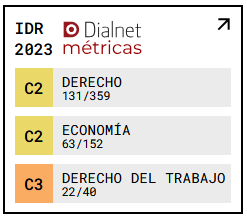Algorithms, psychometry and rights of the unconscious self of the person in the socio-labor field
DOI:
https://doi.org/10.18172/redsye.6242Keywords:
Inteligencia artificial, protección de la mente inconscienteAbstract
Artificial intelligence helps us manage all kinds of decisions with increasing efficiency. In the context of subordinate work, the use of informational assistants powered by predictive algorithms is expected to grow exponentially, describing the antechamber of the society of the future. The use of this technology, in return, is enabling a comprehensive human mapping. Our intentions, emotions, and moods can now be read. This access to the neuronal backyard poses a new challenge because these machines are accumulating the ability to goad the mind, access the unconscious self, and subliminally condition behaviour. If 95 percent of our brain activity occurs below the conscious level, the looming threat deserves a resounding and immediate response. Amid an international debate on neuro-rights, this study suggests the need to create, distinctively, a shield against intrusions below consciousness: the rights of the unconscious self of individuals.
Downloads
References
Ignasi BELTRAN DE HEREDIA (2022), «Nadie da duros a cuatro pesetas (transparencia algorítmica y representantes de los trabajadores: el nuevo art. 64.4.d ET)». En XXXII Congreso Nacional Asociación Española de Derecho del Trabajo y de la Seguridad Social, Ministerio de Trabajo y Economía Social. Pendiente de Publicación (987 – 1001).
Ignasi BELTRAN DE HEREDIA (2020), «Automatización y obsolescencia humana», En Peguera y Cerrillo (Coords.), Retos jurídicos de la inteligencia artificial, Aranzadi. (113 – 124).
James BRIDLE (2020), La nueva edad oscura, Debate.
Jan Christoph BUBLITZ (2022), «Novel Neurorights: From Nonsense to Substance», Neuroethics, 15:7, https://link.springer.com/article/10.1007/s12152-022-09481-3
Nicholas CARR (2016), Atrapados, Taurus.
Nicholas CARR (2011), Superficiales, Taurus.
Marcus DU SAUTOY (2020), Programados para crear, Acantilado.
Marcus DU SAUTOY (2018), Lo que no podemos saber, Acantilado.
Lisa FELDMAN BARRETT (2018), La vida secreta del cerebro, Paidós.
Hannah FRY (2019), Hola Mundo, Blackie Books.
Jared GENSER, Stephanie HERRMANN y Rafael YUSTE (2022), International Human Rights Protection Gaps in the Age of Neurotechnology, NeuroRights Foundation, https:// ntc.columbia.edu/wp-content/uploads/2022/05/NeurorightsFoundationPUBLICAnalysis5.6.22.pdf
Ruth W. GRANT (2021), Los hilos que nos mueven, Avarigani.
Byung-Chul HAN (2022), Infocracia, Taurus.
Philip N. JOHNSON-LAIRD (1990), El ordenador y la mente, Paidós.
Daniel KAHNEMAN (2012), Pensar rápido, pensar despacio, Debolsillo.
Daniel KAHNEMAN, Olivier SIBONY y Cass R. SUNSTEIN (2021), Ruido, Debate.
Viktor MAYER-SCHÖNBERGER y Kenneth CUKIER (2013), Big Data, Turner Noema.
Lee McINTYRE (2020), La actitud científica, Cátedra.
Jesús MERCADER UGUINA (2022), «En busca del empleador invisible: algoritmos e inteligencia artificial en el derecho digital del trabajo», El Cronista, núm. 100 (136 – 145).
José M. MUÑOZ y José A. MORINARO (2022), «The Rise of Neurotechnology: Reconceptualizing Human Rights», CINET, https://inecenter.com/the-rise-of-neurotechnology-reconceptualizing-human-rights/
Ana B. MUÑOZ RUIZ (2022), «Inteligencia artificial y uso de algoritmos para gestionar el trabajo: la deshumanización de los trabajadores», EuSocialCit, https://www.eusocialcit. eu/artificial-intelligence-and-the-use-of-algorithms-to-manage-work-blog/
Cathy O’NEIL (2017), Armas de destrucción matemática, Capitán Swing.
Alex PENTLAND (2010), Señales honestas, Milrazones.
Eric SADIN (2020), La inteligencia artificial o el desafío del siglo: anatomía de un antihunanismo radical, Editorial Caja Negra.
Michael J. SANDEL (2016), Justicia, Debolsillo.
Barrhus F. SKINNER (1980), Más allá de la libertad y la dignidad, Editorial Fontanella.
Cass R. SUNSTEIN (2012), «Análisis conductual del derecho», Themis-Revista de Derecho, núm. 62.
Cass R. SUNSTEIN y Richard THALER (2009), Un pequeño empujón, Taurus.
Alain SUPIOT (2015), La gouvernance par les nombres, Fayard.
Philip TETLOCK (2016), El juicio político de los expertos, Capitán Swing.
Richard THALER (2016), Todo lo que he aprendido sobre la psicología económica, Deusto.
James WILLIAMS (2021), Clics contra la humanidad, Gatopardo Ensayo.
Rafael YUSTE y Sara GOERING (2017), «Four ethical priorities for neurotechnologies and AI», Nature, vol. 551.
Shoshana ZUBOFF (2020), La era del capitalismo de la vigilancia, Paidós.
Downloads
Published
How to Cite
Issue
Section
License

This work is licensed under a Creative Commons Attribution-NonCommercial-NoDerivatives 4.0 International License.











